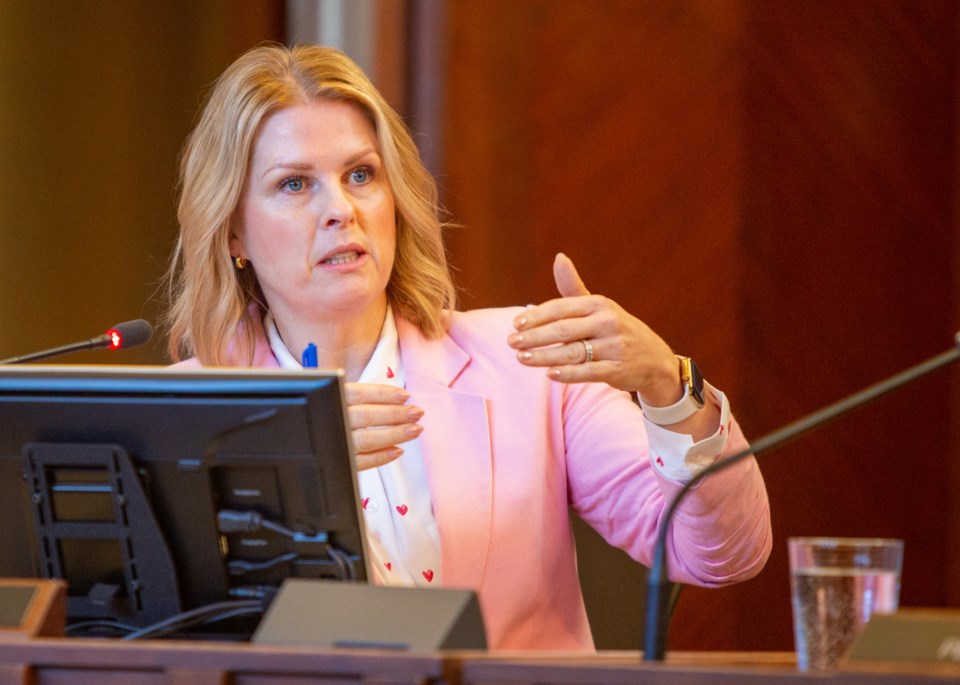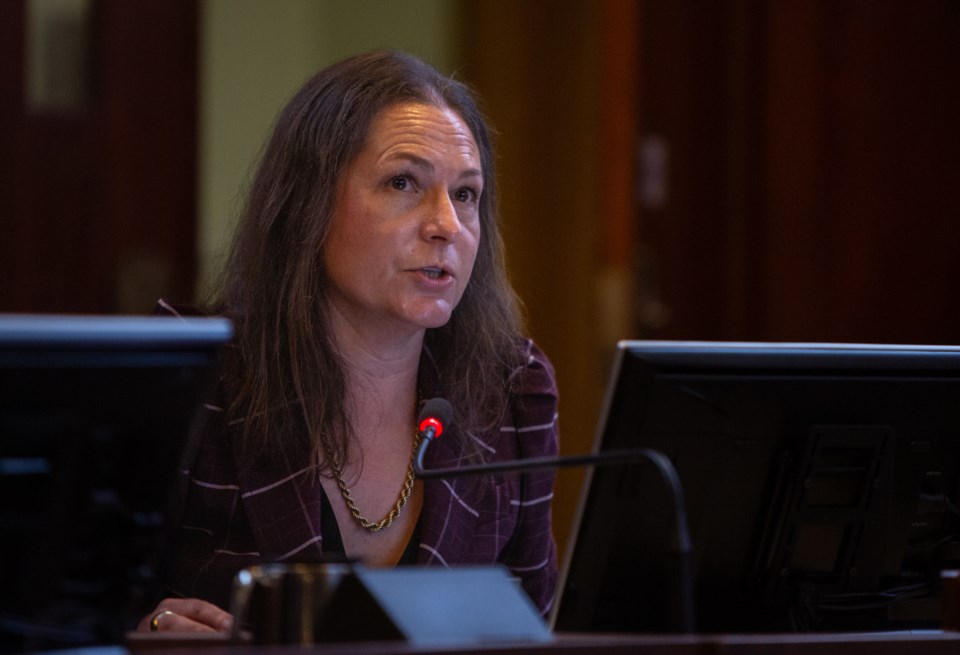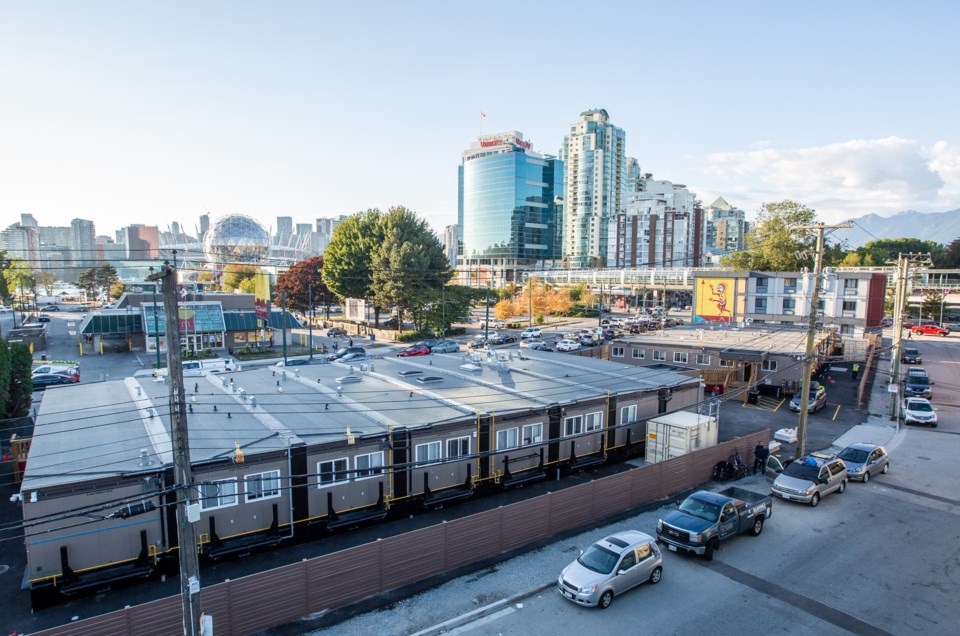Two members of Ken Sim’s ABC Vancouver party are questioning the mayor's plan to pause construction of “net new” supportive housing, and want the province’s housing minister and the CEO of BC Housing to address council over the potential consequences of such a move.
Sim announced Jan. 23 at a public safety forum that he will introduce a motion this month to pause any “net new supportive housing units” in the city until the region’s municipalities build more of the type of housing stock in their communities.
To ensure that happens, Sim will need support from a majority of council.
While Green Party Coun. Pete Fry has pushed back against the move, at least two members of the mayor’s own party — councillors Rebecca Bligh and Lisa Dominato — are now raising concerns over what a “freeze” on supportive housing would mean in Vancouver.
Bligh introduced an “urgent motion” at council Tuesday to invite Housing Minister Ravi Kahlon and BC Housing CEO Vincent Tong to city hall for a public or in-camera meeting to “to discuss implications of the freeze on net new supportive housing on or before February 26.”
The Feb. 26 date is key for Bligh because that is when Sim will open debate on his motion to pause construction of any new supportive housing across the city that would increase the number of units beyond what already exists or is being replaced.
“Less supportive housing for low-income Vancouverites will likely increase homelessness, mental health illness, addictions, and crime,” Bligh said in her motion, noting the Ministry of Housing and Municipal Affairs, with support from the Canada Mortgage and Housing Corp., are working with the city to acquire new supportive housing units.
“This freeze discourages new investment in housing in the city.”

'I'm disappointed'
An argument over procedure in the council chamber has now put Bligh’s motion on the same Feb. 26 agenda as Sim’s motion. That means if Kahlon or Tong did attend city hall that day, they would only get three minutes each to address council, with no questions allowed from councillors.
Bligh was frustrated by the decision to defer her motion.
“I'm disappointed because the value of the motion is of course to hear from BC Housing and the Ministry of Housing before February 26 — it could have been February 25 — and also in a format that allows dialogue,” she told BIV in an interview after the meeting.
Dominato seconded Bligh’s motion, noting the importance of hearing from non-profit housing operators who were not consulted about the mayor’s plan.
“There's largely been no engagement of those organizations, and we need to be having conversations with those organizations because they're the ones delivering the supportive housing,” she told BIV Wednesday.
“They serve people with mental illness. They serve youth who are at risk of homelessness, women fleeing violence, refugees. We've got a number of Indigenous housing providers. So that, to me, is a huge gap in all of this.”
Dominato also emphasized that the mayor’s plan applies to all of Vancouver, not just the Downtown Eastside.
“I supported the motion yesterday because I share the concerns that this is going to actually do more harm potentially, and there's unintended consequences that haven't been considered in terms of disrupting the pipeline of housing stock,” she said.

'Going to do more harm'
Dominato noted the last regional homeless count conducted in March 2023 revealed that 2,420 people were unhoused in Vancouver. Housing experts have said for years that such counts don’t capture the true number of homeless, saying the 24-hour exercise provides a snapshot of a bigger crisis.
“If you're homeless or at risk of homelessness, there's shelters which aren't permanent housing, and there's social housing, which is subsidized housing,” she said.
“But if you need some added support for whatever reason — disabilities, mental illness, you're a senior — disrupting that supportive housing stock and pausing that, to me, is going to do more harm.”
Added Dominato: “Supportive housing is not the problem — it's not the culprit. We've got to be looking at organized crime and the toxic drug supply, and the impact that is having on communities. I just wanted to reflect that, because I think it's another important part of this conversation.”
An example of supportive housing in Vancouver would be the temporary modular buildings set up around the city, including at Main and Terminal, and in the 5000-block of Heather Street.
'Imbalance is unsustainable'
In announcing his plan at the forum hosted by the Save Our Streets coalition, Sim argued that Vancouver is leading the region with the number of supportive housing units.
While Vancouver accounts for 25 per cent of Metro Vancouver’s population, the city has more than 77 per cent of the region’s supportive housing units. In addition, more than 67 per cent of the region's operating shelter spaces and over half of the region's social housing is in Vancouver, Sim said.
“This imbalance is unsustainable, especially when much of our existing supportive housing, including our extensive SRO stock, is aging and frankly, falling apart,” the mayor said in his speech.
“We can't expect people to rebuild their lives in environments that are crumbling around them. Replacing our aging, temporary, modular, supportive housing with permanent units is a critical first step.”
BIV contacted the mayor’s office for a response from Sim on the concerns raised by his councillors, and received this emailed statement: “I look forward to a full and informed discussion with my council colleagues in chambers when my motion becomes public at the end of the month.”
Housing Minister Kahlon said in an email to BIV on the day after Sim’s speech that he looked forward to meeting with the mayor to learn more about his plan.
“My understanding is that the mayor’s argument is that he wants to see other communities building more supportive housing, too,” Kahlon said. “I’m sympathetic to that, but the simple truth is that if we don’t get housing built, that means more people living on the street or in encampments. That doesn’t work for anyone, and it makes our communities less safe.”
BIV contacted Kahlon’s office Wednesday to see if he will attend the Feb. 26 council meeting. A ministry spokesperson said in an email:
“Our office is in touch with the mayor’s office regarding Mayor Sim’s recent statements on supportive housing in Vancouver. If city council submits a request for the Ministry of Housing and Municipal Affairs and BC Housing to send a delegation to attend an upcoming council meeting, we will consider it. Once an invitation has been sent, we will be able to respond to the request in a formal manner.”
BC Housing report
The B.C. government released a report in 2019 that said temporary modular housing buildings in Vancouver and Surrey were improving the quality of life for tenants and reducing their use of emergency services.
The government’s conclusion was based on surveys it did of tenants and staff in four modular housing buildings in Vancouver and three in Surrey. The data was collected six months after tenants moved into their homes.
Many of the tenants – 79 per cent – were previously homeless.
Some of the outcomes included:
• 94 per cent of residents remained housed in their homes after six months.
• 84 per cent reported improvements in their overall well-being.
• 82 per cent said they experienced positive interactions with neighbours.
• 56 per cent noticed an improvement in their physical health.
• 44 per cent said they had been admitted to hospital less often.
• 44 per cent reported improvements in their mental health.
• 39 per cent reported improvements in their “addiction issues.”
Findings were based on a voluntary tenant survey, with a 41 per cent response rate across the seven buildings. Three staff from each building was interviewed.
X/@Howellings



